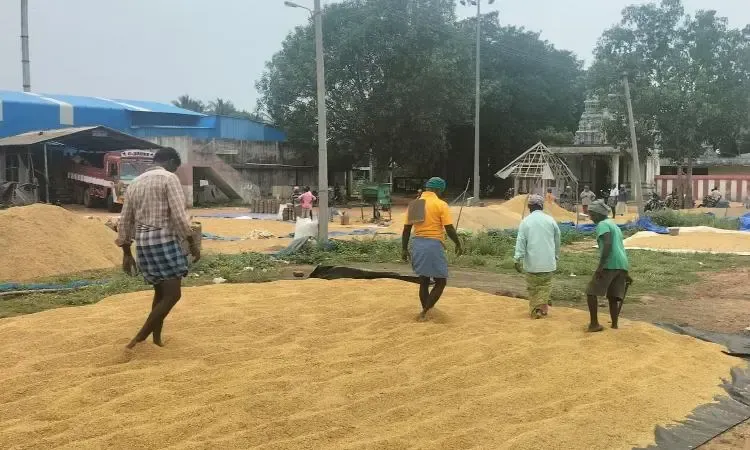Should the Stalin Government Increase the Moisture Limit for Paddy Procurement?

Synopsis
Key Takeaways
- Continuous rainfall has disrupted paddy harvesting in Tamil Nadu.
- Farmers are requesting a temporary increase in moisture limits for procurement.
- Over 1.97 lakh acres of paddy has been cultivated in Thanjavur.
- Heavy rains have resulted in rain-soaked grain awaiting procurement.
- Quick district-level decisions could prevent losses.
Chennai, Sep 27 (NationPress) Recent continuous rainfall has significantly hampered paddy harvesting in Thanjavur and neighboring delta districts of Tamil Nadu, leading to a situation where farmers are urgently requesting government action to amend the existing procurement guidelines. Farmers are advocating for the Stalin administration to temporarily raise the allowable moisture content in paddy at Direct Procurement Centres (DPCs) from 17 percent to 22 percent, to prevent their crops from being rejected due to moisture caused by adverse weather.
During this kuruvai season, paddy was cultivated on about 1.97 lakh acres in Thanjavur, with approximately half of the area already harvested.
Farmers have been delivering their yields to 276 DPCs throughout the district. However, the recent heavy rain, especially in interior regions like Orathanadu, has made it challenging for many to adequately dry their paddy before selling.
Most DPCs lack sufficient drying facilities, resulting in piles of rain-soaked grain awaiting procurement.
Currently, the moisture content in paddy must not exceed 17 percent for government purchasing. However, the wet conditions have caused moisture levels to exceed this threshold, complicating farmers' ability to sell their produce at the government-mandated minimum support prices of Rs 2,545 per quintal for high-quality varieties and Rs 2,500 for common types.
Without immediate relief, farmers are at risk of distress selling to private buyers at significantly lower prices. Growers have urged the state to enable District Collectors to relax moisture standards in response to local weather conditions, rather than waiting for formal approval from the Food Corporation of India (FCI).
Farmers contend that the existing mandatory FCI field inspections delay critical decisions, often until the harvest period is nearly complete, preventing them from benefitting from government procurement.
Workers' unions and agricultural advocates have also urged the Tamil Nadu Civil Supplies Corporation (TNCSC) to obtain central government permission for state-level discretion in adjusting moisture limits based on real-world conditions.
They argue that prompt decision-making at the district level could mitigate losses and help ensure that procurement proceeds smoothly despite unpredictable monsoon rains.
With persistent rain and a significant portion of the harvest still pending in several regions, farmers are seeking an immediate policy change to avert spoilage and safeguard their livelihoods during this crucial procurement phase.









